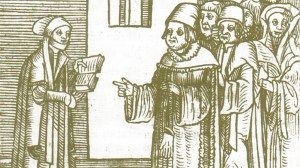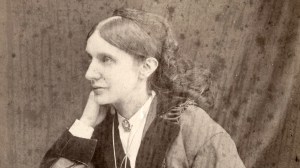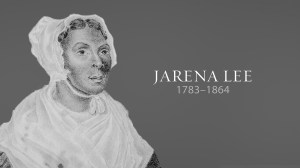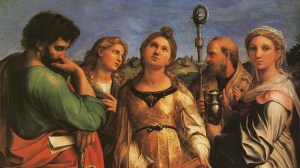In this series

“It is the duty of every Christian to espouse the cause of the faith, to understand and defend it, and to denounce every error.” – Martin Luther
Martin Luther’s doctrine of the priesthood of all believers reverberated against the three “paper walls” of the Roman papacy in his treatise To the Christian Nobility of the German Nation in 1520. Luther criticized the pope and the “Romanists” for dividing the church into the “spiritual estate” and the “temporal estate,” which had resulted in abuses of power.
Instead, Luther redefined the priestly estate:
“All Christians are truly of the spiritual estate, and there is no difference among them except that of office. … This is because we all have one baptism, one gospel, one faith, and are all Christians alike; for baptism, gospel, and faith alone make us spiritual and a Christian people.”
“We are all consecrated priests through baptism. … For whoever comes out of the water of baptism can boast that he is already a consecrated priest, bishop, and pope.”
This was a fool’s doctrine. But, as God spoke through Sarah to Abraham and through an ass to his master, the prophet Balaam, how much more so could God speak “through a righteous man against the pope?” he asked.
But could this priestly ministry even extend to women?
Let’s look at the work of three women who broke the boundaries of their society by speaking out boldly through print, and how they appropriated Luther’s doctrine of the priesthood of all believers to defend their speaking.
Argula von Grumbach
About 260 miles south of Luther’s Wittenberg, a noblewoman named Argula converted from Catholicism reading Luther’s work. She corresponded directly with him throughout the remainder of her life and was one of the few visitors Luther allowed to see him when he was seeking protection in the Coburg castle.
Remarkably, Argula became the first female lobbyist of the Reformation. She even attempted to arbitrate between Lutherans and Zwinglians at the Diet of Augsburg in 1530, arranging a meeting between Melanchthon and Martin Bucer. Her Reformation résumé was truly spectacular, especially for a woman at the time. But perhaps more impressive were her public writings.
Argula was the first female pamphleteer of the Reformation, and her letter to the University of Ingolstadt in 1523 also made her the first female best-seller, going through 14 editions. This letter to the university officials, which included Johann Eck—Luther’s main opponent—was bold, to say the least. In it, she challenged the very people who days prior had arrested university student Arsacius Seehofer for possessing Protestant books and who had forced him to recant his newfound faith or die.
Argula was the first woman to apply Luther’s doctrine of the priesthood of all believers for herself and thereby for other women. This doctrine became her apologia for reproving those in the “spiritual estate.”
She began her letter:
I find there is a text in Matthew 10 which runs: “Whoever confesses me before another I too will confess before my heavenly Father.” And Luke 9: “Whoever is ashamed of me and of my words, I too will be ashamed of when I come in my majesty,” etc. Words like these, coming from the very mouth of God, are always before my eyes. For they exclude neither woman nor man. And this is why I am compelled as a Christian to write to you. For Ezekiel 33 says: “If you see your brother sin, reprove him, or I will require his blood at your hands.”
Argula came to her recipients on equal ground as a Christian. As a Christian, she beseeched and exhorted the Ingolstadt theologians, even requesting that she appear before them in public, speaking and discussing these spiritual matters with them in German: “What I have written to you is no woman’s chit-chat, but the word of God; and [I write] as a member of the Christian Church, against which the gates of Hell cannot prevail.”
Argula at one time had remained silent, but now she believed there was too much at stake for the gospel to not speak.
However I suppressed my inclinations; heavy of heart, I did nothing. Because Paul says in 1 Timothy 2: “The women should keep silence, and should not speak in church.” But now that I cannot see any man who is up to it, who is either willing or able to speak, I am constrained by the saying: “Whoever confesses me,” as I said above. And I claim for myself Isaiah 3: “I will send children to be their princes; and women, or those who are womanish, shall rule over them.”
About a month after she wrote her first letter and under the threat of death as a result, Argula wrote an open letter to the city council of Ingolstadt defending her motives for writing.
Therefore call to mind the vow which you made to God at baptism, which states: “I believe, and renounce all the pomp and illusions of the Devil.” If we believe and trust in God as best we can, that is, if we confess him (and he will empower us to do this), then he will also confess us, as he says in Matthew 10. Therefore to be a Christian means to resist as best we can those who would condemn the word of God; not with weapons, though, but rather with the word of God.
What doctor [of theology] could be so learned that his vow is worth more than mine? The Spirit of God is promised to me as much as to him. As God says in Joel 2: “I will pour out my Spirit upon all flesh, and your sons and daughters will prophesy.”
Like Luther, she saw herself as a fool. However, it was in being a fool that God’s power would be most greatly manifested. Argula borrowed Luther’s lesser to greater arguments and applied them to herself: As Luther was to the pope and Romanists, so Argula was to the theologians. In her last published writing, she gives the same analogy we find in Luther’s treatise. Like Luther, she sees herself as Balaam’s ass, but perhaps even more so than Luther for she is a woman and a layperson.
So let your anger not enflame
Should God raise women up again
To punish your too high disdain.
Awesome for you God’s visitation
Plagued solely by a group of women!
… Just learn from Balaam’s ass, my good, Johannes of Lanzhut.
Katharina Schütz Zell
Further north and to the west, in Strasbourg, Katharina Schütz Zell was also influenced by Luther’s teaching. Unlike Argula, Katharina came from the “middle class” sector of society and was a lifelong author.
Katharina was won over by Luther’s teachings of faith alone in Christ alone. This spurred her to a more active involvement in her church, whose priest was Matthew Zell. Katharina and Matthew married on December 3, 1523, making her one of the first women to marry a Protestant priest in Strasbourg.
Katharina’s new vocation as pastor’s wife opened the door for a more formal religious vocation. She became the “church mother” of Strasbourg, serving alongside her husband, who saw Katharina as an “equal partner” in marriage and called her his “assistant minister.” She took care of refugees in their home, organized city relief care for poor noncitizens, visited the sick, gave homilies at three graveside services, including that of her husband’s, and carried out a lay pastoral ministry after Matthew’s death. Katharina was one of the most active lay reformers in Strasbourg, but her most significant contributions to the reformed movement were her six published writings.
A little more than a year after her marriage, Katharina wrote the bishop of Strasbourg defending clerical marriage after he had placed Matthew and other married priests under church discipline. She intended to publish this letter but was prevented by the city council. However, after more salacious gossip about the Zells seemed to undermine Matthew’s ministry, Katharina published a defense of clerical marriage in September 1524. Like Argula, Katharina made an apologia for speaking out against men in ecclesial power.
Oh, how then can I restrain myself, if I believe the word of God? How can I not do for my neighbor, Matthew Zell, what I would want my neighbor to do for me? Not because he is my husband, but only because he is my brother and fellow member of the body in Christ. … For in God and Christ there is neither man/husband nor woman/wife, nor any partiality (cf. Jas. 2:9; Rom. 2:11), for the word of God concerns only spiritual kinship.
Because of this love of neighbor and obedience to Scripture, Katharina could not “excuse” herself nor could she “persuade my conscience that I should be silent about these very great devilish lies.”
The ramification of such a doctrine was that God is able to take the weak (women like Katharina) and shame the strong (Roman clergy). She began her defense quoting 1 Corinthians 1:27 and then developed and weaved this theme throughout the rest of her work. Katharina related herself to Judith who stood against Holofernes and to Esther whose cunning led to Haman’s hanging. Several times in her pamphlet she called on male individuals by name and challenged them to debate her in German in public.
Katharina, fully aware of the arguments that would be leveled against her for speaking out as a woman, was prepared to answer.
I answer, do you not know, however, that Paul also says in Galatians 3[:28], “In Christ there is neither man nor woman”? And God in the prophet Joel says in chapter 2[:28; cf. Acts 2:17], “I will pour out my Spirit over all flesh, and your sons and daughters will prophesy.” And you know that Zechariah became dumb, so that Elizabeth blessed the Virgin Mary. So may you also receive me in good part. I do not seek to be heard as if I were Elizabeth, or John the Baptist, or Nathan the prophet who pointed out his sin to David, or as any of the prophets, but only as the donkey whom the false prophet Balaam heard. For I seek nothing other than that we may be saved together with each other.
Marie Dentière
A former Augustinian nun, Marie Dentière found refuge in Strasbourg in the mid-1520s after fleeing her convent in northern France because she had become convinced by the teachings of Luther. Like Katharina, whom she knew, Marie married a former priest named Simon Robert in her new city.
Eventually, they were given a pastoral assignment in the Reformed Church and sent to the Rhône valley. Martin Bucer wrote Guillaume Farel, who was already in the area, alerting him of the couple’s arrival and mentioned “Simon’s wife” as an engaging participant in her husband’s ministry.
Within five years, Simon had died, leaving Marie widowed with several small children. She remarried and, in 1535, Marie and her husband, Antoine Froment, moved to Geneva to assist the reformers there in taking over the city from the Catholics. Marie was an active lay reformer in Geneva. She even once entered a Genevan convent preaching marriage and urging the sisters to renounce their vows.
Marie published two writings: A Very Useful Epistle sent to Marguerite, the Queen of Navarre, and also a preface to a sermon given by John Calvin. Although neither writing was addressed to men, in her epistle to the queen in 1539, Marie included a formal defense of women teaching Scripture authoritatively to other women. In Marie’s letter, we can see how an understanding of the priesthood of all believers vis-à-vis women had developed.
Marie began her letter by admonishing Queen Marguerite to speak to her brother, the king, about the chords of division in France. She defended her admonition to Marguerite based on the baptism and faith that they both shared.
For what God has given you and revealed to us women, no more than men should we hide it and bury it in the earth. And even though we are not permitted to preach in public in congregations and churches, we are not forbidden to write and admonish one another in all charity.
Marie emphasized that women were not given a lesser or partial gospel than men, and likewise women were given the same command as men to share that gospel and contend for the faith.
For as you well know, the female sex is more shameful than the other, and not without cause. For until now, Scripture has been so hidden from them. No one dared to say a word about it, and it seemed that women should not read or hear anything in the Holy Scriptures. That is the main reason, my Lady that has moved me to write to you, hoping in God that henceforth women will not be so scorned as in the past.
But Marie knew there were those who would accuse women of audacity and boldness to “write to one another about matters of Scripture.” When that happens, Marie said, they should be answered by pointing to women of the Bible. “Several women are named and praised in Holy Scripture, as much for their good conduct, actions, demeanor, and example as for their faith and teaching,” she wrote. Marie listed such individuals as Sarah, Rebecca, the mother of Moses, Deborah, Ruth, the Queen of Sheba, the Virgin Mary, Elizabeth, and the Samaritan woman. She also spoke of Mary Magdalene:
Who can boast of having had the first manifestation of the great mystery of the resurrection of Jesus, if not Mary Magdalene, from whom he had thrown out seven devils, and the other women, to whom, rather than to men, he had earlier declared himself through his angel and commanded them to tell, preach, and declare it to others?
If these examples from Scripture were not enough to support women expounding Scripture to other women, Marie had theological avenues for persuasion. She appealed to the shared state of human depravity and thereby the shared state of grace in Jesus Christ.
Even though in all women there has been imperfection, men have not been exempt from it. Why is it necessary to criticize women so much, seeing that no woman ever sold or betrayed Jesus, but a man named Judas? Who are they, I pray you, who have invented and contrived so many ceremonies, heresies, and false doctrines on earth if not men? And the poor women have been seduced by them. Never was a woman found to be a false prophet, but women have been misled by them. While I do not wish to excuse the excessively great malice of some women that goes far beyond measure, neither is there any reason to make a general rule of it, without exception, as some do on a daily basis.
While Argula Von Grumbach, Katharina Schütz Zell, and Marie Dentière were not necessarily arguing for a full-orbed egalitarian vision, we must recognize that what they were doing (writing and speaking out on matters of Scripture and faith and asking to argue with men in public) was radically counter-cultural. Their appropriation of the priesthood of all believers, which has largely gone ignored over the last half millennium, was a redemptive move that pushed the biblical application of the role of women forward in a way that had not been done since the days of the New Testament.
And why did they feel empowered to do this? Dentière sums it up nicely:
If God has given grace to some good women, revealing to them by his Holy Scriptures something holy and good, should they hesitate to write, speak, and declare it to one another because of the defamers of truth? Ah, it would be too bold to try to stop them, and it would be too foolish for us to hide the talent that God has given us, God who gives us the grace to preserve to the end. Amen.
Kristen Padilla, is the author of Now That I’m Called: A Guide for Women Discerning a Call to Ministry. She is a writer, Bible teacher, wife to a biblical scholar, mom of one, and on staff at Beeson Divinity School of Samford University in Birmingham, Alabama. Connect with her at kristenrpadilla.com or on Facebook, Twitter, or Instagram.














